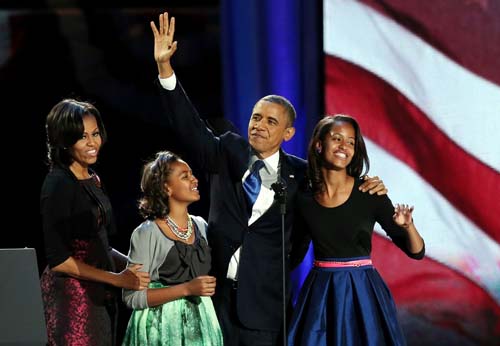|
 |
|
FIRST FAMILY: U.S. President Barack Obama and his family greet supporters before giving a victory speech on November 6 in Chicago, Illinois (XINHUA/AFP) |
In the early hours of November 7, U.S. President Barack Obama stood in front of a cheering crowd and gave a victory speech promising that "the best is yet to come" for America. With his reelection secured and his last campaign behind him, Obama can now fully pursue an agenda of salvaging the American economy and turning attention to U.S. foreign policy. By this time next year, one can expect some major moves by the administration to push new trade agreements, contain global conflicts and wind down U.S. military action in Afghanistan, say pundits.
"For reasons of history and political reality, a reelected Mr. Obama is likely to devote more time to foreign affairs. From Richard M. Nixon to Bill Clinton, presidents have tended to make their bid for statesman status in their second terms. The prospect of continuing gridlock—with the Republicans still controlling the House—gives Mr. Obama all the more reason to favor diplomacy over domestic legislation," wrote journalist Mark Landler in The New York Times.
If transnational threats rising in the Middle East can be contained, Obama wants to turn away from the region and focus on Asia, Martin Indyk, Vice President of foreign policy studies at the Brookings Institution told The Christian Science Monitor.
"I just don't see those things as high on his agenda versus building a relationship with China, promoting India's rise in Asia and seeking the opportunities that lie in that region of the world," he said.
Liu Xuecheng, a senior research fellow with the China Institute of International Studies, told Beijing Review that bilateral relations under the Obama administration were more foreseeable than that of a potential Mitt Romney presidency. "After four years of contact, the current officials of the two countries know each other well and have established dialogue mechanisms for mutual understanding," Liu explained.
Referring to comments made during the presidential debates, wherein President Obama and challenger Romney argued over who would be more tough on China, Liu said Chinese authorities and academics have kept a calm mindset. "They don't really care about the China-bashing tactics," he added.
Nevertheless, Liu expressed concern over a recent shift by the United States in a "pivot" to the Asia-Pacific region after drawing down troops in the Middle East, questioning whether the foreign policy focus is an attempt to contain China and create alliances against it in the region.
To reduce friction between the two countries and achieve a "win-win result," Liu asserted the two sides must enhance cooperation and promote the global economy.
Jin Canrong, Associate Dean of the School of International Studies at Renmin University of China, agreed that Obama's reelection was a better outcome for China than adapting to an incoming Romney administration.
"Obama's win guarantees relatively stable Sino-U.S. relations," said Jin. However, he criticized Washington for involving itself in Asia-Pacific issues and thereby intensifying disputes, such as that between Japan and China over the Diaoyu Islands.
This year, top officials in the Obama administration spent much of their face-time with Asian countries that could be a friction point in Chinese territorial disputes. Obama hosted the Philippines' President Benigno Aquino III in June. Defense Secretary Leon Panetta toured Viet Nam and India in June and Japan in September.
| 